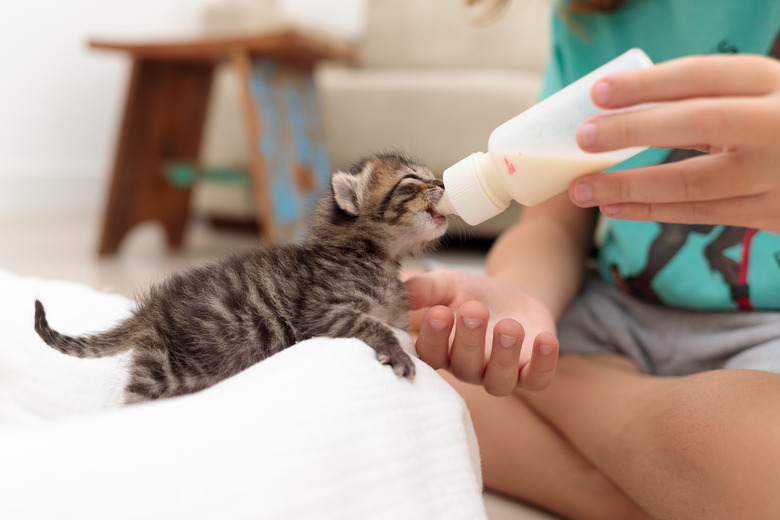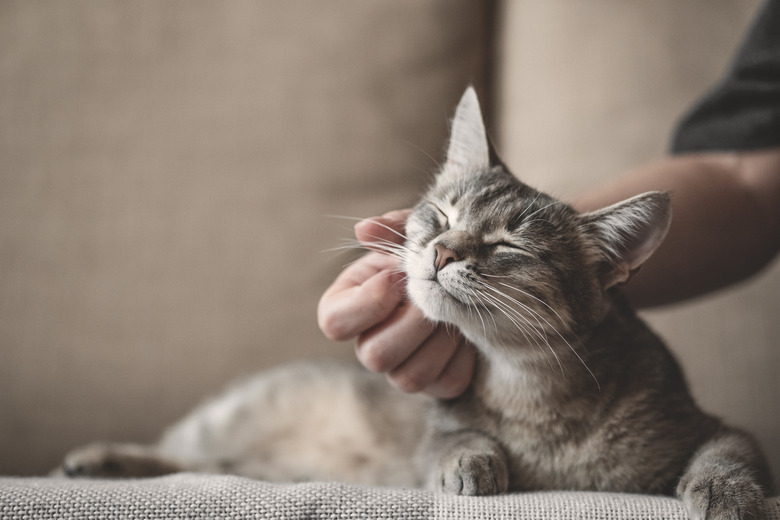Everything You Need To Know About Feeding Your Kitten
Congrats, you're a new kitten owner! Raising a kitten is fun and adorable. It's also pretty easy, but there are some particulars you need to know going in, especially when it comes to feeding. Kittens are very hungry, and there are some special steps you need to take! Here's everything you need to know about what and how much to feed a kitten.
What do kittens eat
What do kittens eat
Your kitten's dietary needs depend on its age. Most adoptable kittens will be at least 8 weeks old. Our guide starts earlier, for those who may have rescued very young kittens, but keep in mind that a cat that young should ideally still be nursing from its mother. If you've rescued kittens younger than 4 weeks old, you should be bottle feeding kitten formula.
Maddie's Fund has a feeding chart to help you determine how much and how often to feed young kittens. A kitten that is 1 to 2 weeks of age, should be bottle-fed 2 to 12 milliliters of kitten formula about seven times per day. A 3-week old kitten can start eating less frequently. Feed 14 to 17 milliliters per feeding five to seven times per day.
Be sure to properly position the kitten for bottle feeding to ensure she doesn't inhale the milk. She should be on her stomach as though she were nursing from her mother. Never bottle feed a kitten when she is on her back.
Weaning a kitten
Weaning a kitten
A 4-week old kitten can be introduced to gruel. Gruel is a mixture of kitten formula and wet kitten food. Some kittens will take to the gruel right away while other kittens may need more encouragement. Put some gruel on your finger and allow the kitten to lick it off. If she still isn't eating, try putting some gruel on her tongue and teeth. Continue bottle feeding during the weaning process to make sure she continues to grow and get the nutrition she needs.
A 5-week old kitten can be weaned off gruel and onto only wet kitten food. Hooray! At this point, you can also introduce dry kitten food to your kitten. Ask your vet what brands they recommend for your kittens.
An 8-week old kitten should be fed wet kitten food two to three times a day. Kittens at this age need a ton of calories: three times as many as adult cats need! A 2-month-old kitten eats roughly one can of kitten food per day. Don't worry, it's hard to forget to feed your kitten at this age: Most will loudly let you know when they're hungry. You can also leave out some dry food for your kitten.
Feeding during the first year
Feeding during the first year
At 3 months old, you can start to feed your kitten three regular meals each day. They may still eat about one can of food per day, or slightly less. To figure out the exact amount to feed your 12-week old kitten, you can ask your vet or the shelter you adopted them from. You can also consult the feeding instructions printed on your kitten's food. As a general rule, kittens this age should be fed until they are full, as they still need lots of calories to grow! If they still demand four meals a day, that's totally fine. They also should still be on kitten food (for both wet and dry) at this age.
For a 4-month-old kitten keep their three-meals-a-day feeding schedule the same, but begin to notice how much your kitty is eating, and adjust accordingly. You might see their previously voracious hunger levels go down to more manageable hunger levels around 4 to 6 months of age.
At 12 months old, you can switch your cat from kitten food to adult cat food. Your kitty is fully grown or near it, and no longer needs the high levels of fat and protein in kitten food. Depending on your cat's hunger levels, you can probably feed them two meals a day now, instead of the previous three. Be sure to feed them their two meals at the same time every day.
Free access to water
Free access to water
Your kitten should have access to fresh water at all times. If they're young enough to be formula feeding, they'll get much of their hydration from their formula. If they're old enough to be on gruel or solid food, make sure they always have access to a dish of water. Tap water or filtered water are both fine. Water should be cold or at room temperature.
What not to feed kittens
What not to feed kittens
As tempting as it is, kittens should never have human food. They need specific nutrients to grow, and their kitten food provides that. "People food" can upset their stomachs, and it's not worth the risk!
Don't feed adult food to kittens. As previously mentioned, cats need the high volume of protein and fat that kitten food provides. Don't switch it out for adult cat food until they're old enough. Additionally, you should not feed your kitten dog or puppy food (or vice versa). Dogs and cats have vastly different nutritional needs so make sure to use a food formulated for your kitten.
This may seem like a lot of information, but don't panic! It will quickly become routine, and should you ever forget, your kitten will loudly remind you. Have fun with your new pet!

